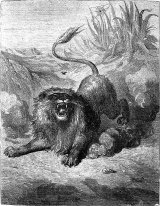The Lion and the Gnat
"The Lion and the Gnat" is a fable by Jean de La Fontaine that teaches about humility and understanding one's true power. It narrates the story of a gnat that, despite its small size, manages to defeat and humiliate a majestic lion, proving that even the most seemingly insignificant creatures can have significant strength. This book with its engaging story and moral lesson encourages children to value all life forms and respect their unique strengths.
"Go, paltry insect, refuse of the earth!" Thus said the Lion to the Gnat one day. The Gnat held the Beast King as little worth; Immediate war declared--no joke, I say. "Think you I care for Royal name? I care no button for your fame; An ox is stronger far than you, Yet oxen often I pursue." This said; in anger, fretful, fast, He blew his loudest trumpet blast, And charged upon the Royal Nero, Himself a trumpet and a hero. The time for vengeance came; The Gnat was not to blame. Upon the Lion's neck he settled, glad To make the Lion raving mad; The monarch foams: his flashing eye Rolls wild. Before his roaring fly All lesser creatures; close they hide To shun his cruelty and pride: And all this terror at The bite of one small Gnat, Who changes every moment his attack, First on the mouth, next on the back; Then in the very caverns of the nose, Gives no repose. The foe invisible laughed out, To see a Lion put to rout; Yet clearly saw That tooth nor claw Could blood from such a pigmy draw. The helpless Lion tore his hide, And lashed with furious tail his side; Lastly, quite worn, and almost spent, Gave up his furious intent. With glory crowned, the Gnat the battle-ground Leaves, his victorious trump to sound, As he had blown the battle charge before, Still one blast for the conquest more. He flies now here, now there, To tell it everywhere. Alas! it so fell out he met A spider's ambuscaded net, And perished, eaten in mid-air. What may we learn by this? why, two things, then: First, that, of enemies, the smaller men Should most be dreaded; also, secondly, That passing through great dangers there may be Still pitfalls waiting for us, though too small to see.
Translation
Translate and read this book in other languages:
Select another language:
- - Select -
- 简体中文 (Chinese - Simplified)
- 繁體中文 (Chinese - Traditional)
- Español (Spanish)
- Esperanto (Esperanto)
- 日本語 (Japanese)
- Português (Portuguese)
- Deutsch (German)
- العربية (Arabic)
- Français (French)
- Русский (Russian)
- ಕನ್ನಡ (Kannada)
- 한국어 (Korean)
- עברית (Hebrew)
- Gaeilge (Irish)
- Українська (Ukrainian)
- اردو (Urdu)
- Magyar (Hungarian)
- मानक हिन्दी (Hindi)
- Indonesia (Indonesian)
- Italiano (Italian)
- தமிழ் (Tamil)
- Türkçe (Turkish)
- తెలుగు (Telugu)
- ภาษาไทย (Thai)
- Tiếng Việt (Vietnamese)
- Čeština (Czech)
- Polski (Polish)
- Bahasa Indonesia (Indonesian)
- Românește (Romanian)
- Nederlands (Dutch)
- Ελληνικά (Greek)
- Latinum (Latin)
- Svenska (Swedish)
- Dansk (Danish)
- Suomi (Finnish)
- فارسی (Persian)
- ייִדיש (Yiddish)
- հայերեն (Armenian)
- Norsk (Norwegian)
- English (English)
Citation
Use the citation below to add this book to your bibliography:
Style:MLAChicagoAPA
"The Lion and the Gnat Books." Literature.com. STANDS4 LLC, 2025. Web. 21 Jan. 2025. <https://www.literature.com/book/the_lion_and_the_gnat_2489>.




Discuss this The Lion and the Gnat book with the community:
Report Comment
We're doing our best to make sure our content is useful, accurate and safe.
If by any chance you spot an inappropriate comment while navigating through our website please use this form to let us know, and we'll take care of it shortly.
Attachment
You need to be logged in to favorite.
Log In